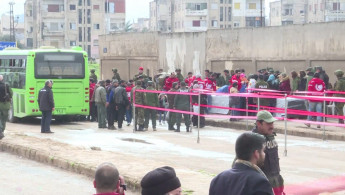Syrian rebels begin evacuation from besieged Homs neighbourhood
Syrian opposition fighters and their families have begun leaving al-Waer, the last rebel-held neighbourhood in the central city of Homs as part of a Russian-backed evacuation deal signed earlier this week.
Reporters saw scores of opposition fighters and their families leaving the area on Saturday in buses bound for the northern rebel-held town of Jarablous on the border with Turkey.
The al-Waer neighborhood is home to about 75,000 people and has been under a government siege since 2013, triggering shortages of medicine, and occasionally of food.
Some opposition activists have criticised the agreement, saying it aims to displace 12,000 al-Waer residents, including 2,500 fighters.
The evacuation will take place over the coming weeks.
The Syrian regime has since wrestled back complete control of Homs city – with the exception of al-Waer – and last year announced plans for ambitious rebuilding projects in several districts of the city, none of which appear to have begun.
Although small-scale deals between the Syrian regime and rebel groups in the last two years have seen hundreds of local residents and gunmen leave the area – often in evacuation deals to Idlib province – al-Waer has faced a tight siege accompanied by intermittent bombardment since 2015.
 |
Siege tactics have been used by the Syrian regime in other areas – such as east Aleppo – in order to pummel and starve rebel forces and local communities into submission |  |
Such tactics have been used by the Syrian regime in other areas – such as east Aleppo – in order to pummel and starve rebel forces and local communities into submission before negotiating settlement deals in its best interests.
The Syrian conflict began six years ago, when the Baath regime - in power since 1963 and led by Bashar al-Assad -responded with military force to peaceful protests demanding democratic reforms during the Arab Spring wave of uprisings, triggering an armed rebellion fuelled by mass defections from the Syrian army.
According to independent monitors, hundreds of thousands of civilians have been killed in the war, mostly by the regime and its powerful allies, and millions have been displaced both inside and outside of Syria.
The brutal tactics pursued mainly by the regime, which have included the use of chemical weapons, sieges, mass executions and torture against civilians have led to war crimes investigations.
(with input from agencies)





 Follow the Middle East's top stories in English at The New Arab on Google News
Follow the Middle East's top stories in English at The New Arab on Google News


![22 Arab countries at COP29 have rejected the targeting of fossil fuels [Getty]](/sites/default/files/styles/image_330x185/public/2024-11/GettyImages-2184289638.jpg?h=199d8c1f&itok=ptHl5bec)